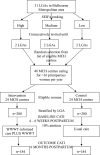A cluster randomised controlled trial of a brief couple-focused psychoeducational intervention to prevent common postnatal mental disorders among women: study protocol
- PMID: 25248497
- PMCID: PMC4173107
- DOI: 10.1136/bmjopen-2014-006436
A cluster randomised controlled trial of a brief couple-focused psychoeducational intervention to prevent common postnatal mental disorders among women: study protocol
Abstract
Introduction: Postnatal common mental disorders among women are an important public health problem internationally. Interventions to prevent postnatal depression have had limited success. What Were We Thinking (WWWT) is a structured, gender-informed, psychoeducational group programme for parents and their first infant that addresses two modifiable risks to postnatal mental health. This paper describes the protocol for a cluster randomised controlled trial to test the clinical effectiveness and cost-effectiveness of WWWT when implemented in usual primary care.
Methods and analysis: 48 maternal and child health (MCH) centres from six diverse Local Government Areas, in Victoria, Australia are randomly allocated to the intervention group (usual care plus WWWT) or the control group (usual care). The required sample size is 184 women in each group. English-speaking primiparous women receiving postpartum healthcare in participating MCH centres complete two computer-assisted telephone interviews: baseline at 4 weeks and outcome at 6 months postpartum. Women attending intervention MCH centres are invited to attend WWWT in addition to usual care. The primary outcome is meeting Diagnostic and Statistical Manual-IV (DSM-IV) diagnostic criteria for major depressive episode; generalised anxiety disorder; panic disorder with or without agoraphobia, agoraphobia with or without panic, social phobia, adult separation anxiety or adjustment disorder with depressed mood, anxiety or mixed depressed mood and anxiety within the past 30 days at 6 months postpartum. Secondary outcomes are self-rated general and emotional health, infant sleep problems, method of infant feeding, quality of mother-infant relationship and intimate partner relationship, and healthcare costs and outcomes.
Ethics and dissemination: Approval to conduct the study has been granted. A comprehensive dissemination plan has been devised.
Trial registration number: Australian New Zealand Clinical Trials Registry ACTRN12613000506796. UTN: U1111-1125-8208.
Keywords: MENTAL HEALTH; PREVENTIVE MEDICINE; PRIMARY CARE; PUBLIC HEALTH.
Published by the BMJ Publishing Group Limited. For permission to use (where not already granted under a licence) please go to http://group.bmj.com/group/rights-licensing/permissions.
Figures
Similar articles
-
Gender-informed, psychoeducational programme for couples to prevent postnatal common mental disorders among primiparous women: cluster randomised controlled trial.BMJ Open. 2016 Mar 7;6(3):e009396. doi: 10.1136/bmjopen-2015-009396. BMJ Open. 2016. PMID: 26951210 Free PMC article. Clinical Trial.
-
Preventing postnatal maternal mental health problems using a psychoeducational intervention: the cost-effectiveness of What Were We Thinking.BMJ Open. 2016 Nov 18;6(11):e012086. doi: 10.1136/bmjopen-2016-012086. BMJ Open. 2016. PMID: 27864246 Free PMC article. Clinical Trial.
-
Early intervention to protect the mother-infant relationship following postnatal depression: study protocol for a randomised controlled trial.Trials. 2014 Oct 3;15:385. doi: 10.1186/1745-6215-15-385. Trials. 2014. PMID: 25277158 Free PMC article. Clinical Trial.
-
Prevention of postnatal mental health problems in women: knowledge exchange in primary care in Victoria, Australia.Health Promot J Austr. 2015 Apr;26(1):64-69. doi: 10.1071/HE14062. Health Promot J Austr. 2015. PMID: 25773160
-
Innovative psycho-educational program to prevent common postpartum mental disorders in primiparous women: a before and after controlled study.BMC Public Health. 2010 Jul 23;10:432. doi: 10.1186/1471-2458-10-432. BMC Public Health. 2010. PMID: 20653934 Free PMC article.
Cited by
-
Postpartum depressive symptoms in the context of high social adversity and reproductive health threats: a population-based study.Int J Ment Health Syst. 2018 Jul 28;12:42. doi: 10.1186/s13033-018-0219-x. eCollection 2018. Int J Ment Health Syst. 2018. PMID: 30069229 Free PMC article.
-
Gender-informed, psychoeducational programme for couples to prevent postnatal common mental disorders among primiparous women: cluster randomised controlled trial.BMJ Open. 2016 Mar 7;6(3):e009396. doi: 10.1136/bmjopen-2015-009396. BMJ Open. 2016. PMID: 26951210 Free PMC article. Clinical Trial.
-
Early postnatal demoralisation among primiparous women in the community: measurement, prevalence and associated factors.BMC Pregnancy Childbirth. 2015 Oct 12;15:259. doi: 10.1186/s12884-015-0680-3. BMC Pregnancy Childbirth. 2015. PMID: 26459266 Free PMC article.
-
Preventing postnatal maternal mental health problems using a psychoeducational intervention: the cost-effectiveness of What Were We Thinking.BMJ Open. 2016 Nov 18;6(11):e012086. doi: 10.1136/bmjopen-2016-012086. BMJ Open. 2016. PMID: 27864246 Free PMC article. Clinical Trial.
References
-
- Gavin NI, Gaynes BN, Lohr KN, et al. . Perinatal depression: a systematic review of prevalence and incidence. Obstet Gynecol 2005;106:1071–83 - PubMed
-
- Brockington I Postpartum psychiatric disorders. Lancet 2004;363:8. - PubMed
-
- Ross L, McLean L. Anxiety disorders during pregnancy and the postpartum period: a systematic review. J Clin Psychiatry 2006;67:14 - PubMed
-
- Deloitte Access Economics. The cost of perinatal depression in Australia: final report. Postal and Antenatal Depression Association. Secondary The cost of perinatal depression in Australia: final report. Postal and Antenatal Depression Association 2012. http://www.panda.org.au/images/stories/PDFs/PANDA_Exec_Summ_Deloitte_Web...
-
- National Institute for Health and Clinical Excellence. Antenatal and postnatal mental health. Cinical Management and Service Guidance. NICE clinical guidline 45 2007;guidance.nice.org.uk/cg45 - PubMed
Publication types
MeSH terms
Associated data
LinkOut - more resources
Full Text Sources
Other Literature Sources
Medical
Miscellaneous

